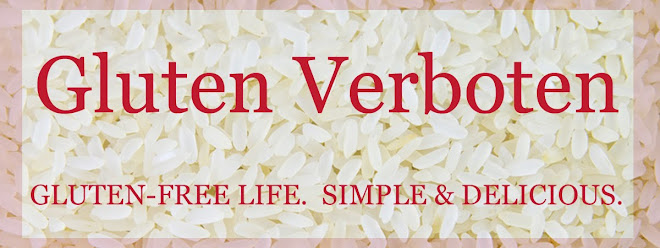Another celiac friend of mine from work has been super-careful about his rice intake. Not the type, as much as it's origin. He and I both have had bad reactions to "tainted" rice. I have stopped buying rice from the farmer's market for this reason. There is no way to be sure they haven't processed or stored their rice with un-G-F ingredients. My recommendation is to rinse your rice thoroughly before cooking. If you use Nishiki rice, or possibly other Japanese rices, the rice plumps way better when cleaned. (A Japanese friend of mine made that recommendation.)
Here is my favorite link I discovered on my Google search of "White VS Brown Rice." http://www.lammd.com/opinion/brown_rice_vs_white_rice.cfm This is what the site says:
 Milling is the process that creates the difference between brown and white rice. The variety of rice may be identical, but milling removes the husk from the grain and turns the brown rice to white. This is why milling is often called "whitening".
Milling is the process that creates the difference between brown and white rice. The variety of rice may be identical, but milling removes the husk from the grain and turns the brown rice to white. This is why milling is often called "whitening".By removing the outer layer, which is also known as the bran layer, milling alters the nutritional value of the rice. It is in this bran layer where most of the nutrients are stored. The white rice that most of us eat comprises of mostly carbohydrates, with the nutrients stripped off in the milling process.
Carbohydrates are broken down into sugar inside the body. While carbohydrates are a good source of energy (yielding 4 calories per gram), excessive carbohydrate intake leads to sugar imbalance and adult onset diabetes mellitus. Carbohydrate consuming is also addictive. White rice is a large part of the world's diet , and reduction is not a easy process. One way is to consume brown rice instead.
The following chart shows the nutritional differences between brown and white rice. As can be observed, fiber is dramatically lower in white rice, as are the oils, most of the B vitamins, and important minerals.
| | Brown Rice (one cup) | White Rice (one cup) |
| Calories | 232 | 223 |
| Protein | 4.88 g | 4.10 g |
| Carbohydrate | 49.7 g | 49.6 g |
| Fat | 1.17 g | 0.205 g |
| Dietary Fiber | 3.32 g | 0.74 g |
| Thiamin (B1) | 0.176 g | 0.223 g |
| Riboflavin (B2) | 0.039 mg | 0.021 mg |
| Niacin (B3) | 2.730 mg | 2.050 mg |
| Vitamin B6 | 0.294 mg | 0.103 mg |
| Folacin | 10 mcg | 4.1 mcg |
| Vitamin E | 1.4 mg | 0.462 mg |
| Magnesium | 72.2 mg | 22.6 mg |
| Phosphorus | 142 mg | 57.4 mg |
| Potassium | 137 mg | 57.4 mg |
| Selenium | 26 mg | 19 mg |
| Zinc | 1.05 mg | 0.841 mg |
Bran contains several items of major importance - the two major are: fiber and essential oils. Fiber is not only filling, but is recommended in the prevention of major diseases in this country such as certain gastrointestinal diseases and heart disease. The National Cancer Institute recommends 25 grams of fiber a day, a cup of brown rice will give nearly 3.5 g, while an equal amount of white rice not even 1 g. The oils that are present in the bran also help to lower the risks of heart disease by decreasing the levels of serum cholesterol in our bodies. These are good oils that the body needs and not bad oils (hydrogenated vegetable oils) such as those found in French fries.
Carbohydrate-rich diets can be helpful in weight control provided that the carbohydrate is complex and not simple. Simple carbohydrate such as sugar will lead to obesity, cancer, and a myriad of other diseases.
We are much better off, then, to eat a well balanced diet low in fat and rich in complex carbohydrates. Brown rice completes the diet in a way that white rice cannot even begin to approach.

3 comments:
This is a really interesting post! I've been wanting to try and incorporate brown rice into my diet, but haven't yet. This is just more motivation! I had no idea there was such a big difference between brown and white rice!
Yup brown rice is much better for you. I eat a lot of brown rice here. Probably 60% of the time I cook rice at home it's brown rice.
Do you use a rice cooker? If you do you should use twice the amount of water (maybe a little more) when cooking brown rice. It also helps to let it soak overnight before cooking. :)
I LOVE my rice cooker. Mine's not as cool as the one Sammy got Nick, but I couldn't live without it. :)
Post a Comment